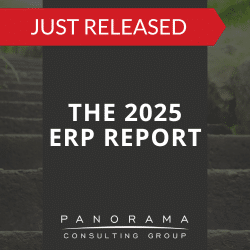Global cyber-attacks seem to be at an all-time high. It’s no surprise that business leaders are thinking about ERP data security more than ever.
If you’re implementing an ERP system to gain access to intelligent insights, it’s time to start thinking about how you’ll protect your business data. Today, we’re sharing a few factors to keep in mind during the ERP implementation process.
Why Hackers Target ERP Systems
With so many business platforms available to target, why are so many ransomware and cybersecurity attacks aimed at ERP software?
Put simply, these platforms contain some of a company’s most important, sensitive, and confidential information. If a hacker can make their way in, they can use that data to . . .
• Steal personally identifiable information about employees, customers, and stakeholders
• Access or transfer financial records without authorization
• Disrupt critical business operations by manipulating and corrupting data
• Bring business processes to a halt
ERP Selection Guide
This ERP Selection Guide will help you select technology that will support your organization for at least the next ten years.
The Key Challenges of ERP Data Security
The task of securing ERP data often gets moved to the back burner as teams focus on quickly going live with their new system.
Why do organizations procrastinate? One word: Complexity. A single ERP application contains a range of individual elements, all of which contain their own datasets. These include:
• Processes and workflows
• Hardware infrastructure
• Network infrastructure
• Master data
In addition, most platforms integrate with other business applications, and those integration points need to be secured, as well.
This requires a level of IT security that most organizations don’t have in-house. While some companies might be able to rely on internal expertise to weather a security breach, not all are equipped to do so. For many organizations, the consequences could be damaging enough to close their doors indefinitely.
Organizations without in-house security expertise often invest in enterprise cybersecurity reskilling. More commonly, though, organizations are migrating to cloud-based platforms managed by third-party providers. All of the top ERP systems have cloud deployment options, and many vendors’ flagship solutions are exclusively cloud-based.
Cloud software can provide the following benefits:
• Physical security (no on-premise servers to damage, break into, or steal)
• Vendor compliance with strict IT security standards
• Access to trained and experienced IT staff to analyze and protect systems and networks
Tips for Ensuring ERP Data Security
1. Cover All Your Bases
It’s important to secure all your ERP assets. In addition to hardware and software, this includes services, processes, network accounts, and all other connected entities.
Hackers can gain unauthorized access to your company’s ERP applications through several avenues, which include but aren’t limited to:
• Vulnerable network traffic
• Weak passwords
• Unpatched operating system vulnerabilities
• Poor control standards for protecting file access
• APIs that lack secure integration or encryption protocols
• Lack of multifactor authentication criteria
Sometimes, companies contribute to these vulnerabilities without even knowing it. Routine scans and penetration tests can help teams assess potential problems before an attack occurs.
2. Understand Your Responsibilities vs. Your Vendor’s
Ultimately, security is your responsibility.
While moving to a cloud-based infrastructure shifts some of the responsibility from your IT department to the cloud service provider, security is an area where both parties bear responsibility.
Understanding who is responsible for which security measures is crucial to keeping your ERP network safe.
3. Prioritize ERP Maintenance
Review your vendor’s maintenance plan so you know what it includes. Your vendor should provide regular software updates and security patches, while helping you stay up to date with routine system maintenance.
4. Prepare End-Users
Hackers know that employees are the quickest and easiest route to company data. However, employees can’t be vigilant if they don’t know what to look for.
New vulnerabilities are created daily, and employees need to learn to recognize potential threats in all shapes and forms. This is where it becomes important to develop a continuous training plan addressing the different types of attacks each department might encounter.
You’ve Been Attacked: Now What?
If a hacker uses ransomware to take your ERP data hostage, you need to know what to expect.
Most often, the hacker will share their intentions to make your data public. Then, you’ll be forced to take one of two actions:
• Provide the encryption key
• Delete the data
Hackers may also request payment.
Then, you’ll need to assess the damage. Security teams (in-house or vendor-provided) will need to take inventory of exactly which data was compromised and how far the damage extends.
In addition, executives will need to assess the vulnerabilities that led to the attack and determine how to prevent similar breaches from happening again.
Data Security in the Age of AI
Many ERP systems now feature generative AI, which opens up new concerns about data security.
Generative AI allows users to create new data, not just analyze it. As such, companies that use this functionality need to rethink their security strategies.
AI technologies are not only vulnerable to threats like social engineering and phishing, but they make it easier for attackers to create malicious code.
While some AI vendors claim they design their models to reject such requests, employees don’t always have the tools and training required to activate and audit those built-in security controls.
(Learn more about AI in ERP.)
Keep Your ERP Data Safe
What would happen if the information in your ERP system fell into the wrong hands?
It’s not a pleasant thought.
By prioritizing ERP data security, you can prepare your company for dodging cyberattacks (and mitigating damages if worst comes to worst.)
Our ERP consulting team can help you select and implement software while keeping ERP security top of mind. Contact us below for a free consultation.













